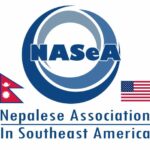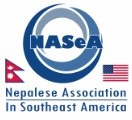Press Release:
Topic: Current Perspective on Political Crisis in Nepal
Bimal Nepal President, Nepalese Association in Southeast America (NASeA)
December 20, 2015
Today Nepalese Association in Southeast America (NASeA) and Association of Nepalese in Midwest America (ANMA) jointly hosted the monthly talk program on “Current Perspective on Political Crisis in Nepal.” Speakers Mr. Mukesh Singh and Dr. Sagar Rijal gave their respective perspective on the above theme.
Background: After a decade-long Maoist insurgency, Nepal finally became a federal democratic republic. In April and May, this year Nepal was hit by two back-to-back large earthquakes that devastated the country, killing close to 9,000 people and causing almost $10 billion worth of damages to physical structures. Earthquakes also triggered the long-awaited constitution was “fast tracked” and promulgated on Sept. 20, after seven grueling years of negotiations. With almost 90 percent majority of the Constitutional Assembly endorsement it should have been one of the happiest moments in the history of Nepal, but it was not to be. The Madhesh-centric parties (representing a section of people from Nepal’s southern plains) had been protesting for more rights and proportional representation in the new constitution, even before it was promulgated. After the promulgation, they felt their demands were ignored, and took to the street to protests.
Since September, 51 people have died in protests at border points with India. Protester in Raxaul blocked the border while India silently imposed transit blockade at other points citing security concerns for its drivers. This has caused shortage of vitals such as fuel, foods and medicine. The fuel shortage will push more than 800,000 people below the poverty line according to Nepal Central Bank estimates. Similarly, United Nations has expressed deep concern over what it said is a “critical” shortage of lifesaving medicines and fuel, and warns this could put at least three million children at risk of illness in the coming winter months.
In North America, numerous protest rallies were held from Washington DC, New York, Boston, San Francisco, Chicago and Ottawa denouncing the
unannounced economic and transit blockade by India which violates the rights of landlocked countries like Nepal. Such protest rallies have galvanized the NRNs worldwide and have played a catalytic role to unite Nepalis as well as to increase the pressure on the Indian government and Nepali politicians. Letters were submitted to the White House, Indian Embassy and a meeting was held at the State Department to discuss the current situation. Similarly, a protest rally and a cycle rally supporting the rights of Madhesh were conducted by ANTA in DC and NY.
Highlights of the Talk Session:
Speaker 1: Mr. Mukesh Kumar Singh (Columbus, Ohio)
Mr. Singh highlighted the fact that there are 3 main issues currently facing Nepal in terms of current political crisis. 1) Issue of border demarcation (simankan) 2) Representation based on population size 3) Rights associated with Naturalized Citizenship.
Legal Perspective: Political parties are of the opinion that the newly promulgated constitution by over 90% of the elected represented body secures new mandates and that they are not bound by the earlier 11 points agreements as the new mandates makes the earlier agreement moot. Madhesh based party felt that the new constitution did not give them mandate to ignore the old agreements as that was not mentioned anywhere prior to promulgation.
India’s Official position: Since 11 points agreement was signed in the Indian Embassy, India feels that if Nepal cannot implement those agreements signed under its watchful eye then any such future role by India would not be taken seriously by any other so it wants to see that this agreement is respected first. India also officially claims that they have not created an unannounced economic blockade of Nepal.
Social Perspective: There is a feeling among Madhesi groups that Pahadi sect feels those folks from Darjeeling, Burma and even Bhutan as being closer to “Nepalis” than those who have lived in Tarai for entire few generations.
Root Cause: Identity based federalism is the root cause of the current political crisis. In US different states wanted to be together and so federalism worked. In the context of Nepal we are experiencing exact opposite where we are using federalism to divide ourselves and go separate ways. According to one estimate, to sustain federalism we need 3.71 lakh
police and civil servant. Separate Legislature, bureaucracy, police et. all have to be created but we do we have the revenue source to sustain it? Do we have resources? We will have to face double VAT taxation at federal level and at local level.
There are 3 groups within Tarai. All are united on the issue of geographical boundary demarcation. However, no one wants this to develop into communal violence. While understanding has been reached on representation based on population and rights of naturalized citizenship, the issues of geographical boundary demarcation is the most contentious.
Role of NRN: NRN can and must play greater role to resolve it. See below for further details on roles we can play.
Speaker 2: Dr. Sagar Rijal (Alexandria, VA)
Dr. Rijal spoke on the current situation in Nepal from an international relations perspective. The constitutional and political crisis facing Nepal has prompted strong and varied reactions to India’s role. Some have accused New Delhi’s foreign policy establishment and political leadership of showing partisan interest and illegal intervention in Nepal’s internal matters, while others claim that India has remained strictly neutral and supportive of the path of democratic process within Nepal.
The analysis shows that the true motivation of Indian actions stems of the immutable fact of Nepal’s dependent relationship with India. While the Indian blockade is very much real for the Nepalese, the Indian government can plausibly deny its existence. Also, the strategy of a blockade itself seems like an ad hoc policy tool used to bring the recalcitrant leaders of the establishment to a compromising mood to amend the constitution. As the crisis lengthens, the Indian foreign policy establishment must begin to look for a safe landing approach of negotiated compromise.
India has always had a seat at the negotiation table when it comes to future of Nepal and that role is unavoidable given our geographic and historical reality. Nepal’s diplomats are equally unprepared to make its case heard properly internationally as well. It is necessary for all actors to begin creative diplomacy and build confidence measures. The leaders in Kathmandu must acknowledge that no solution to the impasse is possible without India’s active and mediated role and blessing.
Q&A with moderation:
Dr. Tilak Shrestha, Mani Nepali, Bimal Nepal, Sushil Sharma,
Gopal Regmi, Bishwaman Angdembe, Gajendra Aryal, Krishna Shrestha, Ramesh Gurung, Dr. Dilip Panthi, Prakash Nepal, Padam Bishwakorma, Sharad Ghimire, Sushma Shrestha, Balaram Panthi, Bishnu Ghimire, and Padam Sharma took turns in asking questions to the speakers.
Looking forward:
This talk program was the first of its kind in the US in the open forum format where people came together and expressed genuine concerns about Nepal. There were total of 74 participants on the conference call. Key message was that all sides have pretty much hit the wall so what’s next. We believe both NRN and the US Government have a key role to play. We need to continue to exert pressure on our elected officials both here and in Nepal to help broker the solution. NRN as well as well as the State Department can play a catalytic role of a mediator.
Moderator(s): Kiran ‘Ron’ Sitoula: Vice Mayor for the Town of Indian Head, Maryland
Shailesh Shrestha: Journalist/Host and Producer Sampreshan with White Himal TV in NJ/NY Region.
Opening Remarks: Bimal Nepal President, NASeA
Closing Remarks: Sushil Sharma President, ANMA
Facilitator:
Shailendra Bajracharya EVP/Chair, External Relations Committee, NASeA




 Click here to become a member
Click here to become a member